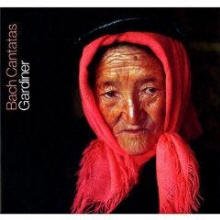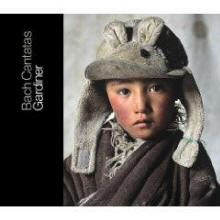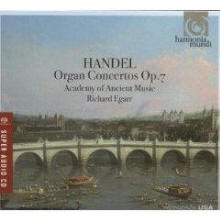|
You are reading the older HTML site Positive Feedback ISSUE 44july/august 2009
Notes of an Amateur, August, 2009
Bach, Cantatas, John Eliot Gardiner. Monteverdi Choir and English Baroque Soloists. Vols. 4 and 17. Soli Deo Gloria SDG 150 and 156. One of the most interesting and telling observations about this wonderful Bach cantata cycle is that while the choir and musicians are often different in large degree from one performance to the next, the sound and spirit of the series remains constant. For practical reasons—the series took place over the course of a year in a great many different venues all over Europe and the UK—it would have been impossible to get the same performers week in and week out, so there is nothing odd about this. But the consistency of aesthetic vision is remarkable. One could say that with the same leader, of course this would be the case; but it's not that simple. The leader must be an extraordinary one—one whose view of the music is so clear and constant it cannot help but bring all subject to its direction under its sway. These latest releases offer me another welcome opportunity to describe what Gardiner's extraordinary vision is and what separates his Bach from so many others. Especially evident in these, as always 'live,' performances in January, 2000 (Haddington in Scotland) and July/August later that same year (Berlin, Ansbach) is an ease and confidence that expresses the assurance that this is a major dramatic story that needs to be told, illuminated, and, finally, celebrated. Told naturally. Without excess of reverence or even glory. Sung and played as written, its importance as human tale and myth will come forth. Gardiner's Bach can be poignant, thoughtful and reflective, beautiful and joyful, anxious and fearful—as text and music ask. But it never feels forced, never feels as if an urgent patina of grandeur or religiosity has been applied to its surfaces. We are never asked to kneel or attend with special awe. There is no need. I cannot praise the unaffected success of Gardiner's Bach enough, especially to those who misguidedly suspect that something more is required. Nothing more is required. It is all here, as definitively presented as I expect it will ever be. Gardiner's musicians and singers create the rich and complex world that the Cantatas represent. I have spent more time with Volume 4 of this pair, partly because I find it so emotionally involving. So if you're still not a part of this pilgrimage, I suggest you start here.
Handel, Organ Concertos, Opus 7, Richard Egarr, organ and director, Academy of Ancient Music. Harmonia Mundi. HMU 807447.48. I knew this would be a winner before hearing a note, based on the success of Egarr's earlier offering of Opus 4, and I was not disappointed. For fans of classical music, these concertos are much-loved chestnuts; but as such, they require an unusual performance to realize the fresh life they deserve. And that, thankfully, is what Egarr and his revivified Academy bring to them. All of the ebullience we associate with Handel at his best but don't always get is here. Sound quality (this is an SACD, though I only listened to the Redbook layer) has a good deal to do with the success of the recordings. Instrumental detail is vividly present, including that of the organ, which comes through as the wonderfully articulate wind instrument that it is. Another especially notable feature of this interpretation—and Egarr assists ably here—is that it reminds us that inspired music need not be profound. Handel's organ concertos are light in the best sense, as distinguished from what 'Pops' orchestras generally offer us. Light does not have to mean emotionally thin, silly, or sentimental. It does not have to sound like lite beer or blush wine. It can be light as fun and joy are light, as dance and song are light. Which leads to my last note. No one better understands what ceremony is than Handel. These concertos celebrate the joyful and intoxicating pomp of ceremony supremely. Both of Egarr's recordings of this music are the best I know. Systems used for this audition: Audio Note CDT3 transport and Dac 4.1 Balanced Signature. Blue Circle FtTH hybrid integrated amplifier; BC 3000II GZpz preamplifier and BC204 amplifier. Jean Marie Reynaud Emeraude and Orfeo loudspeakers. With Blue Circle BC6000 line conditioner. Audio Note Pallas and Sootto interconnects; Audio Note Lexus and SPx speaker cables. Bob Neill, in addition to being an occasional equipment and regular music reviewer for Positive- Feedback Online, is also proprietor of Amherst Audio in Amherst, Massachusetts, which sells equipment from Audio Note, Blue Circle, and JM Reynaud, among others.
|



